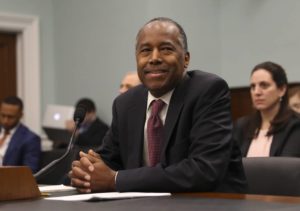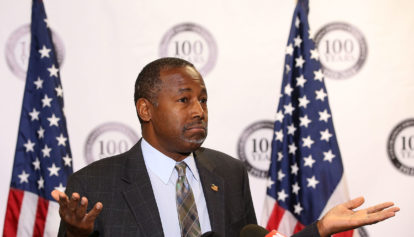
Housing and Urban Development Secretary Ben Carson takes his seat before testifying before a House Committee on Appropriation subcommittee hearing on Capitol Hill in Washington, Tuesday, March 20, 2018. (AP Photo/Pablo Martinez Monsivais)
WASHINGTON (AP) — Housing Secretary Ben Carson, under fire after his office ordered a $31,000 dining set, told a House panel Tuesday that he left furniture purchasing decisions to his wife.
Carson said that he was unaware of the purchase, and canceled it as soon as he learned about it in news reports. But emails released by an accountability organization last week suggest that Carson and his wife, Candy Carson, both played a role in selecting the furniture.
On Wednesday, Carson told a House Appropriations subcommittee that he and his wife looked at furniture catalogs together. But “the prices were beyond what I wanted to pay,” he said. Carson added, “I made it clear that didn’t seem right to me.”
Carson said he then put his wife in charge of furniture selection.
“I left it with my wife to help choose something,” he said, adding that he “dismissed” himself from the process because he had more important things to do.
Carson said he was shocked when he found out about the $31,000 price tag.
“I said, ‘What the heck is that all about?'” he said. “I investigated and immediately had it canceled. Not that we don’t need the furniture but I thought that was excessive.”
On his wife’s role, Carson said “a style and a color was selected by her with the caveat that we were not happy with the pricing and they needed to find something. If anybody knew my wife they would realize how ridiculous this was, she’s the most frugal person in the world.”
Carson told the panel that if it were up to him, “my office would probably look like a hospital waiting room.” Carson added that he is “not really big into decorating” but invited his wife to help.
Carson said he chose to redecorate his office with furniture and curtains he found in HUD’s subbasement, with a total renovation cost, including new blinds, of $3,500. But Carson said a few months later he was told that the dining room needed to be replaced “because people were being stuck by nails, a chair collapsed from somebody sitting in it.”
Carson said his staff felt that the dining room table was “a facilities issue, not a decorating issue,” in response to why his staff did not notify Congress of the purchase, which exceeded the $5,000 cap.


